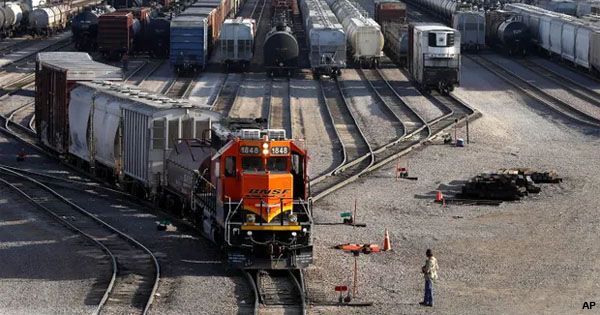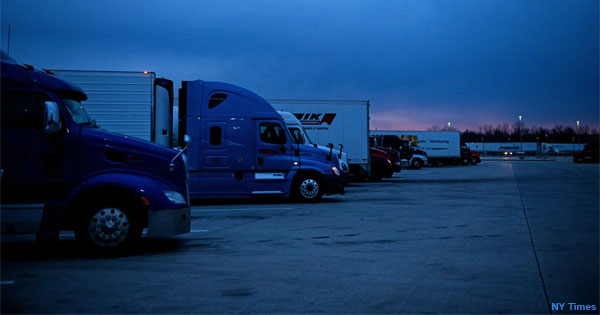NEWS ROUNDUP
Teamsters show good faith | Cody’s ‘good run’ | Starbucks: It’s not working
Tuesday, March 15, 2022
LOCAL
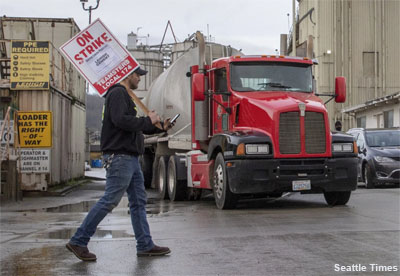 ► From the Seattle Times — Teamsters offer to send some drivers back to work, but still no deal to end Seattle concrete strike — After months on strike, some Seattle-area concrete mixer drivers could return to work this week. But they still have not reached a deal with their employers. Teamsters Local 174 offered to return to work as soon as Tuesday at three of the six Seattle concrete suppliers where workers are on strike. Negotiations would continue. A spokesperson for the concrete suppliers issued a statement saying only that “the Union can return to work at any time and does not require Company approval for this return. The companies remain legally obligated to continue bargaining with the Union for a new agreement even if the strike ends.” The strike of about 300 drivers has dragged on for months, slowing public and private construction jobs across the region.
► From the Seattle Times — Teamsters offer to send some drivers back to work, but still no deal to end Seattle concrete strike — After months on strike, some Seattle-area concrete mixer drivers could return to work this week. But they still have not reached a deal with their employers. Teamsters Local 174 offered to return to work as soon as Tuesday at three of the six Seattle concrete suppliers where workers are on strike. Negotiations would continue. A spokesperson for the concrete suppliers issued a statement saying only that “the Union can return to work at any time and does not require Company approval for this return. The companies remain legally obligated to continue bargaining with the Union for a new agreement even if the strike ends.” The strike of about 300 drivers has dragged on for months, slowing public and private construction jobs across the region.
TODAY at The Stand — Striking Teamsters offer to return to work at 3 concrete companies — Teamsters 174’s Rick Hicks: “Unlike the Employers, we care deeply about our communities and the people who live in them, which is why we are making this good-faith offer.”
MORE coverage from the PS Business Journal, KING and KIRO.
► From the (Longview) Daily News — NORPAC employees narrowly vote down union at Longview paper mill — Employees at the Longview paper mill NORPAC narrowly voted against unionizing last month in the staff’s first effort to organize. The NLRB reports of the 226 votes counted, 110 chose to unionize and 116 voted against unionization. ILWU Local 21 filed the petition for NORPAC to vote on whether to unionize last fall. The AWPPW reportedly tried to unionize NORPAC several times, but never reached the voting stage.
 ► From KUOW — Newly formed Amazon Fresh union faces first firing — Less than a month after a new union formed at an Amazon Fresh store in Seattle, the first union member there has been fired. Kaylyn Richards said she was fired after making a clerical error related to filling out her timesheet. Richards lives in the United Indians Youth Home, in Ballard. She’s 26 years old, and has aged out of the program there, which is designed to keep young people out of homelessness. She says the paystubs from Amazon Fresh were going to be her ticket to an apartment of her own. But now that she’s been fired, that’s all up in the air. Richards said she believes Amazon allowed her firing to go through because of her membership at her store’s new union, Amazon Workers United.
► From KUOW — Newly formed Amazon Fresh union faces first firing — Less than a month after a new union formed at an Amazon Fresh store in Seattle, the first union member there has been fired. Kaylyn Richards said she was fired after making a clerical error related to filling out her timesheet. Richards lives in the United Indians Youth Home, in Ballard. She’s 26 years old, and has aged out of the program there, which is designed to keep young people out of homelessness. She says the paystubs from Amazon Fresh were going to be her ticket to an apartment of her own. But now that she’s been fired, that’s all up in the air. Richards said she believes Amazon allowed her firing to go through because of her membership at her store’s new union, Amazon Workers United.
EDITOR’S NOTE — This bad headline implies more firings of union supporters may come, which normalizes illegal activity. To be clear, workers in America have the right to join together in unions, to express their views on unions, to talk with their co-workers about their interest in forming a union, to wear union buttons, to attend union meetings, etc. If an employer fires them for exercising these rights, the employer has broken the law.
?Today Amazon Workers United filed labor charges against @amazon for unlawfully firing union organizer Kaylyn Richards. @NLRBGC @NLRB must immediately bring a 10(j) injunction and enhanced remedies against Amazon. pic.twitter.com/3i250gMGL0
— Coalition to Defend Amazon Workers (@CDAW_National) March 13, 2022
► From the PSBJ — Shipbuilding to continue ‘long into the future,’ Vigor says after $181M Harbor Island sale — A longtime center of the region’s shipbuilding industry has a new owner with the $180.6 million sale of Vigor Industrial’s 27-acre Harbor Island property. “This is a sale/long-term leaseback. We will retain full operational control of the property and there will be no change to our day-to-day operations,” a Vigor spokesperson said. “The Harbor Island Shipyard, and the associated jobs, will continue operations long into the future.”
► From the Seattle Times — Families of people killed, injured in 2019 Seattle crane collapse awarded $150 million — The April 27, 2019, collapse also killed ironworkers Andrew Yoder, 31, and Travis Corbet, 33. Their families have filed a separate lawsuit, which is set for trial in late May.
THIS WASHINGTON
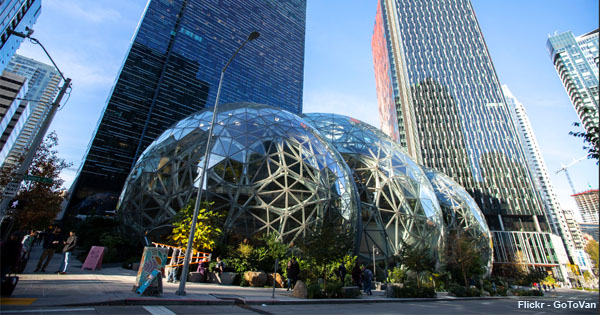
► From the PS Business Journal — Tensions between tech workers and employers were plain to see in Olympia — A slate of bills proposed during the latest Washington state legislative session homed in on the relationship between employers and employees. While several proposals aimed to grant employers more power, others attempted to codify transparency in the workplace. Only a handful of those bills were successful — notably, proposals concerning nondisclosure agreements, salary transparency and cyber harassment — but the legislative efforts underscore the uneasy relations between large tech employers and a highly compensated workforce.
 ► From the West Seattle Blob — Longtime State Rep. Eileen Cody of West Seattle retiring: ‘I had a good run’ — After more than 27 years of representing West Seattle and the rest of the 34th Legislative District, State Rep. Eileen Cody is retiring. She has chaired the House Health Care and Wellness Committee and tirelessly worked for improved patient safety, mental health parity, public health services and to restore the universal purchase of vaccines. She says, “It’s time … I had a good run.” She’s hoping to spend time traveling with her husband. But she’ll be on the job until her term ends when her successor takes office next January.
► From the West Seattle Blob — Longtime State Rep. Eileen Cody of West Seattle retiring: ‘I had a good run’ — After more than 27 years of representing West Seattle and the rest of the 34th Legislative District, State Rep. Eileen Cody is retiring. She has chaired the House Health Care and Wellness Committee and tirelessly worked for improved patient safety, mental health parity, public health services and to restore the universal purchase of vaccines. She says, “It’s time … I had a good run.” She’s hoping to spend time traveling with her husband. But she’ll be on the job until her term ends when her successor takes office next January.
EDITOR’S NOTE — Cody recently retired after working at Kaiser Permanente (formerly Group Health) in Seattle for the past 40 years. She is a neuro-rehab nurse certified in both rehabilitation nursing and multiple sclerosis care. In addition to her work at Kaiser Permanente, Eileen is a founding member of SEIU Healthcare 1199NW.
► From the union-busting Columbian — GOP state Rep. Larry Hoff won’t seek re-election
EQUAL PAY DAY
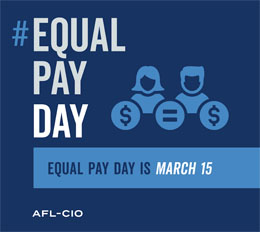 ► From Forbes — What Equal Pay Day 2022 data is—and is not—telling us — Equal Pay Day falls on March 15 this year, which signifies how far into the new year the average woman must work to be paid what the average man was paid the previous year. Last year Equal Pay Day landed farther into the year on March 23, and revealed a slightly larger gender wage gap of 82 cents on the dollar as compared to this year’s 83 cents. On the surface, this looks like progress. Yet these numbers are not telling the whole story. In February 2022, 1.1 million fewer women were in the labor force than at the start of the pandemic. The latest figure accounts only for the women who remained in the workforce full time, and fails to reflect the financial impact for the millions of women who lost their jobs or who were pushed out of the workforce due to lack of childcare or other factors—many of whom were low-paid workers—or the women moving to part-time jobs. This caused the overall median earnings for the women who remained working full time to rise.
► From Forbes — What Equal Pay Day 2022 data is—and is not—telling us — Equal Pay Day falls on March 15 this year, which signifies how far into the new year the average woman must work to be paid what the average man was paid the previous year. Last year Equal Pay Day landed farther into the year on March 23, and revealed a slightly larger gender wage gap of 82 cents on the dollar as compared to this year’s 83 cents. On the surface, this looks like progress. Yet these numbers are not telling the whole story. In February 2022, 1.1 million fewer women were in the labor force than at the start of the pandemic. The latest figure accounts only for the women who remained in the workforce full time, and fails to reflect the financial impact for the millions of women who lost their jobs or who were pushed out of the workforce due to lack of childcare or other factors—many of whom were low-paid workers—or the women moving to part-time jobs. This caused the overall median earnings for the women who remained working full time to rise.
► From the AP — Biden moving to narrow gender pay gap for federal workers — The White House is marking Equal Pay Day by taking new steps aimed at ending the gender pay gap for federal workers and contractors. President Joe Biden on Tuesday is signing an executive order that encourages the government to consider banning federal contractors from seeking information about job applicants’ prior salary history. And a new Labor Department directive is aimed at strengthening federal contractors’ obligations to audit payrolls to help guard against pay disparities based on gender, race or ethnicity.
THAT WASHINGTON
► From the Washington Post — Millions of vulnerable Americans likely to fall off Medicaid once the federal public health emergency ends — As many as 16 million low-income Americans, including millions of children, are destined to fall off Medicaid when the nation’s public health emergency ends, as states face a herculean mission to sort out who no longer belongs on rolls that have swollen to record levels during the pandemic.
► From Politico — ‘Pretty brutal’: Hiring woes plague Biden effort to contain wildfires — The Forest Service has long struggled with staffing shortages, but the challenges have intensified amid a hyper-competitive labor market and cost-of-living concerns.
NATIONAL
 ► From More Perfect Union — Starbucks hit with charges over sweeping illegal union-busting scheme — Starbucks Workers United has filed charges with the NLRB alleging that Starbucks has been cutting workers’ hours nationwide in a deliberate union-busting campaign. In a survey of its members, Starbucks Workers United says that workers have lost anywhere between two and 15 hours from their schedules each week. Starbucks requires at least 20 hours worked per week to maintain eligibility for benefits. The complaint says that the reductions have happened in at least 20 states, including Maryland, Florida, New York, Ohio, Colorado, California, and Texas. The complaint asserts:
► From More Perfect Union — Starbucks hit with charges over sweeping illegal union-busting scheme — Starbucks Workers United has filed charges with the NLRB alleging that Starbucks has been cutting workers’ hours nationwide in a deliberate union-busting campaign. In a survey of its members, Starbucks Workers United says that workers have lost anywhere between two and 15 hours from their schedules each week. Starbucks requires at least 20 hours worked per week to maintain eligibility for benefits. The complaint says that the reductions have happened in at least 20 states, including Maryland, Florida, New York, Ohio, Colorado, California, and Texas. The complaint asserts:
“The reduction of hours has resulted in lost pay; has rendered, or will soon render, employees ineligible for benefits that have hours-worked eligibility requirements, including health care coverage and the Starbucks College Achievement Plan (tuition coverage); and has or will soon result in the constructive discharge of Starbucks employees.”
EDITOR’S NOTE — Hey, Starbucks. It’s not working. In fact, it’s backfiring. As of today, 139 Starbucks stores in 27 states have filed for union elections and your employees increasingly seek to join together to protect themselves and improve their working conditions. Meanwhile, the rest of us are watching your disgusting union-busting, and making our coffee choices accordingly.
► From the Guardian — ‘Completely demoralized’: Railroad workers pushed to the brink — American railroad workers are criticizing a new restrictive attendance policy at one of the largest railroad freight networks in the US, as they experience grueling schedules and labor cuts in the midst of new union contract negotiations, which have hit an impasse, prompting federal mediation. The Guardian spoke with several railroad trainmen and engineers who requested to remain anonymous as they are prohibited by their employer from speaking to the media.
► From the Minneapolis S-T — Minneapolis teacher strike continues; district raises pay offer, cites ‘financial limit’ — Negotiations continued Monday between the Minneapolis public school district and its teachers union as the group’s strike stretches into a new school week. After weekend mediation sessions, district and union leaders both said they want to end the strike quickly. District officials said their latest offer represents a “financial limit.”
► From WHYY — Paid family and medical leave poised to become law in Delaware — Delaware is poised to become the 10th state to provide paid family leave after revisions to an earlier bill gained widespread legislative support as well as the backing of the state’s largest employer and most powerful business group.
► From WHIO — Collins Aerospace, union reach agreement on contract; lockout ends at Troy plant — Collins Aerospace and UAW Local 128 have reached an agreement on a new contract, which will end a lockout of about 300 employees at the company’s plant in Troy.
Today is our union’s 135th birthday!
Throughout our history, we’ve provided security for millions of working families & organize every day to ensure the opportunities of our skilled trades benefit as many people as possible.
Join our fight & come build the future with us! pic.twitter.com/5Tc6dY4UDz
— IUPAT (@GoIUPAT) March 15, 2022
TODAY’S MUST-READ
► From the NY Times — How life as a trucker devolved into a dystopian nightmare (by ) — Today, long-haul truckers are some of the most closely monitored workers in the world. Cameras and sensors dot their trucks, watching the road, the brakes and even the driver’s eye movements. Once, when his truck’s cabin heater broke, Jon Knope was forced to sleep in freezing temperatures for several days while traveling across northern Ohio and New York because an automated system made sure his engine was turned off at night. The company told him there was no way to override the system. Just imagine finishing 10 hours at a desk job, only to return to your apartment to find the heat didn’t work. That’d be quite frustrating. Then imagine your apartment was your office and most nights dinner was a microwaveable burrito or a bag of fast food. And then imagine your desk job required you regularly press a little pedal, you couldn’t stand up, you had essentially no face-to-face contact with co-workers, and if a bathroom didn’t easily present itself you were forced to use a plastic jug — all while a computer or a person at a desk hundreds of miles away monitors your every move.
It wasn’t always like this, said Jerry Fritts, a retired long-haul trucker from Memphis who started full-time in the field in 1966. Trucking used to be a good job, with union representation, decent pay and benefits, and normal hours. Before deregulation during the Carter administration, trucking was an industry with high union representation. But fears of inflation pushed the government to allow less regulated, nonunionized firms to compete with the unionized common carriers. That effectively took the bottom out of the labor market, and as companies raced to offer the lowest rates to customers, wages were squeezed. Working conditions and pay cratered, and truckers fled.
The Stand posts links to Washington state and national news of interest every weekday morning by 10 a.m.

